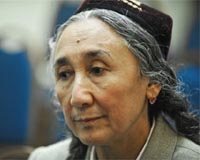 |
Shanghai (AFP) July 31, 2009 Shanghai nurse Lu Ming wants a second baby but it is not China's one-child policy that is holding her back. If anything, she is being encouraged to increase the size of her family as the city faces the challenge of providing for its ageing population. Last week it reminded couples such as Lu and her husband -- both of whom are only children because of the policy -- that they are eligible to have a second child. Comments by Shanghai family planning director Xie Lingli published on the front page of the government-run China Daily were initially seen as a signal that the controversial one-child policy was about to be relaxed after 30 years. However, days later a report by China's official Xinhua news agency quoted Xie as saying she was simply stating rules that had been in place for years and that Shanghai never pursued measures that parted from national policies. Yet for young university-educated mothers such as Lu, who said she was aware of the policy exceptions for having a second child, government officials' words alone mean little in the face of the rising costs of raising a bigger family. "I had one child and now I want to have a second one," the 31-year-old said. "But not every family can afford to have a second child," she added. "To raise a second child you have to take all the financial costs into consideration, otherwise it's not responsible." Nevertheless, analysts say recent media attention reflects a struggle between demographers alarmed by a shrinking workforce and ageing population and officials clinging to the mindset that China has too many people. "The fact this caused such a media storm shows the wind is blowing the other way and it's about time," said Wang Feng, a sociology professor at the University of California, Irvine. "It's a monumental decision that China has to face: what to do about a policy that came out as an emergency measure and was supposed to last for only a generation," Wang said. Regardless of whether China decides to phase out the one-child policy, population decline is inevitable after more than 15 years of fertility rates below the replacement level of 2.1, Wang said. The government has yet to understand that young career-minded women and rising living costs signal demographic trends similar to those in Western Europe, and birth rates will fall even further, Wang said. "China needs to realise there is a demographic crisis quickly in order to prevent it from deepening," he said. Even though the rules for having a second child are not new, by publicly encouraging people to take advantage of them Shanghai officials may be trying to counter propaganda tilted towards encouraging only one child, he said. "Having a second child is often portrayed as if it's a sign of backwardness and not contributing to the country's goal of controlling population growth," Wang said. A senior Shanghai district family planning official insisted that encouraging eligible couples to have a second child had been going on for nearly five years since new exceptions to the one-child policy were introduced. Couples are asked a series of questions when they register to marry to determine if they can have more than one child, the official said, declining to be named due to the sensitivity of the issue. She provided a bright booklet distributed in Shanghai since 2005 which spells out who is eligible to have a second baby, with children's book-style illustrations showing a young father with two children hanging off his arms. Conditions include one of the couple being disabled, one working on a fishing boat at sea for five years, and one being an only child from a rural household. Urban couples who do not meet the criteria but have a second child nonetheless, are fined the equivalent of three times the per capita income in their city, the booklet said. The fine for a Shanghai couple, based on 2008 figures, would be about 80,000 yuan (11,800 dollars) -- a price wealthy families are often willing to pay. But in a Shanghai park bouncing her six-month-old grandson on her knee, 51-year-old Huang Yuanxiang said that, for most of the younger generation, the biggest barrier to having more than one child is economic. For her grandson to prosper, he will have to go to good schools that cost money. "In my generation, none of us was rich and things were not expensive so it cost little to have more than one child," she said. "We didn't face the same financial burden as they do." Share This Article With Planet Earth
Related Links China News from SinoDaily.com
 Australia says Uighur leader is no 'terrorist'
Australia says Uighur leader is no 'terrorist'Sydney (AFP) July 31, 2009 Australia has rebuffed Chinese objections over a visit by exiled Uighur leader Rebiya Kadeer, saying she is not a "terrorist" and there is no reason to exclude her. Foreign Minister Stephen Smith said Kadeer had been given a visa for next week's visit, during which she will launch a documentary about her life and meet members of Australia's Uighur community. "This will be, I think, her ... read more |
|
| The content herein, unless otherwise known to be public domain, are Copyright 1995-2009 - SpaceDaily. AFP and UPI Wire Stories are copyright Agence France-Presse and United Press International. ESA Portal Reports are copyright European Space Agency. All NASA sourced material is public domain. Additional copyrights may apply in whole or part to other bona fide parties. Advertising does not imply endorsement,agreement or approval of any opinions, statements or information provided by SpaceDaily on any Web page published or hosted by SpaceDaily. Privacy Statement |